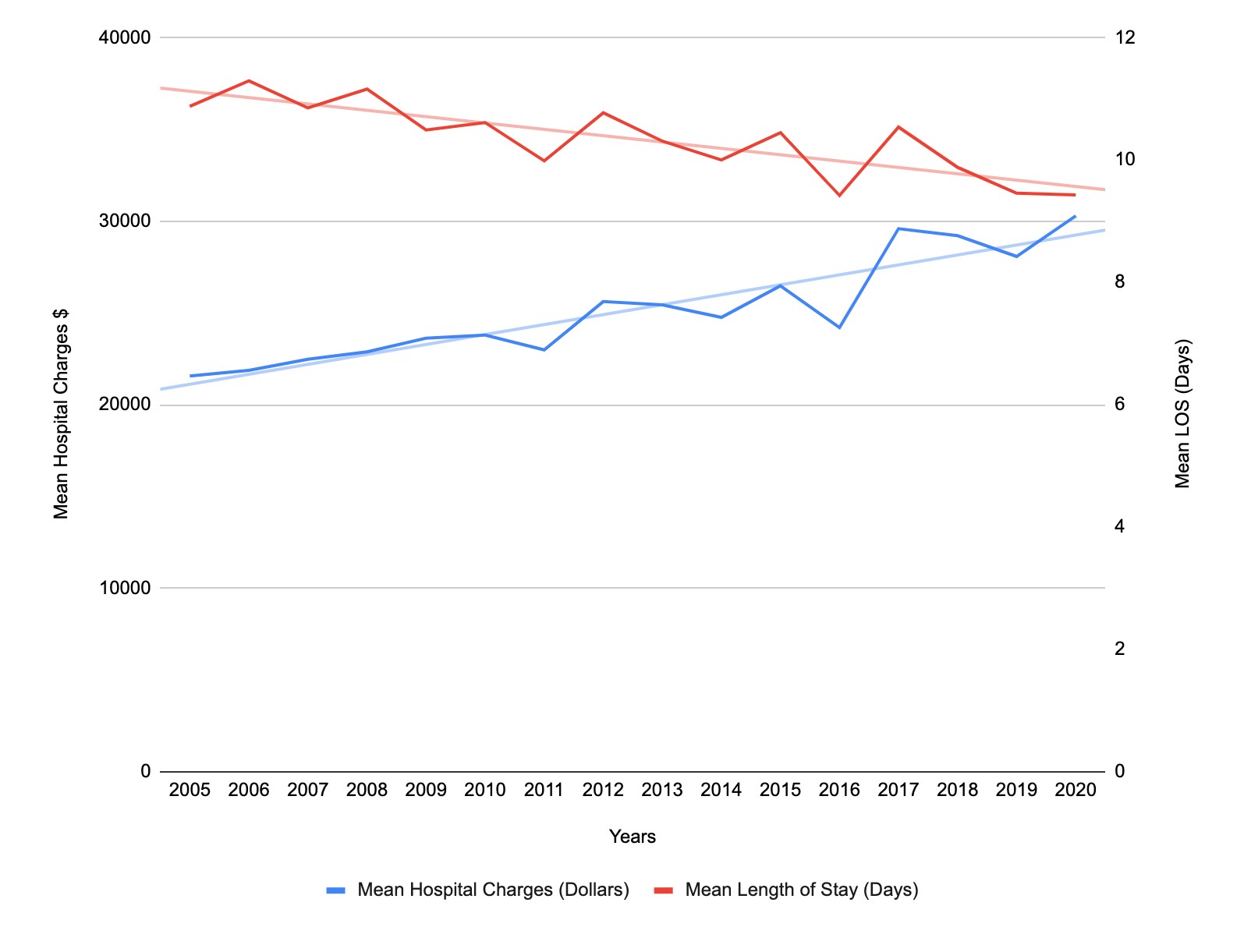Tuesday Poster Session
Category: Small Intestine
P4941 - Trends in Mortality, Hospitalization Charges, and Length of Stay for Small Bowel Cancer Patients: A 15-Year Analysis (2005-2020)
Tuesday, October 29, 2024
10:30 AM - 4:00 PM ET
Location: Exhibit Hall E

Has Audio

Venkat Arutla, MD
Rochester General Hospital
Rochester, NY
Presenting Author(s)
Venkat Arutla, MD1, Sheza Malik, MD1, Muhammad Faisaluddin, MD1, Vishali Moond, MD2, Chengu Niu, MD1, Prajjwol Bhatta, MD1, Karin Dunnigan, MD1
1Rochester General Hospital, Rochester, NY; 2Saint Peter's University Hospital, New Brunswick, NJ
Introduction: Small bowel cancers, while less common, pose a significant healthcare burden in the United States, accounting for approximately 0.6% of all new cancer cases and 0.3% of cancer deaths according to the Surveillance, Epidemiology, and End Results (SEER) program data. Our study aims to provide insights into the evolving trends in treatment, management costs, and clinical outcomes associated with small bowel cancer.
Methods: We performed a retrospective analysis of the U.S. Nationwide Inpatient Sample (NIS) database (2005-2020), examining adults aged ≥18 hospitalized with malignant neoplasm of the small intestine, identified by ICD-9 and ICD-10 codes. Our study focused on annual hospitalization trends for small intestine cancer and assessed outcomes, including length of stay (LOS), hospital charges, and in-hospital mortality.
Results: Our analysis identified 70,735 patients with a principal diagnosis of small bowel cancer. The cohort was predominantly aged 65-84 (46.9%), Caucasian (69.91%), and from the Southern region (38.29%). Medicare was the primary payer for 53.89% of patients, and a substantial majority had a Charlson Comorbidity Index (CCI) of 5 or greater (84%).
Our study revealed a fluctuating yet overall decrease in mortality rates for small bowel cancer from 2005 to 2020, starting at 5.69% in 2005 and dropping to 4.14% by 2020. The mean length of stay in hospitals shows a gradual decline, decreasing from 10.88 days in 2005 to 9.43 days in 2020. Concurrently, there's a noticeable increase in hospitalization costs, with the mean charges rising from $21,563.50 in 2005 to $30,290.97 in 2020. The adjusted cost trend also reflects this increase, growing from $16,172.63 in 2005 to $30,290.97 in 2020.
Discussion: Our findings of small bowel cancer hospitalizations reveal modest improvements in patient outcomes, evidenced by slightly lower mortality rates and a shortened length of stay. However, the mortality rate, though declining, continues to be a significant issue. Concurrently, the rise in treatment costs presents a growing challenge. Our study, therefore, underscores the need to balance improving small bowel cancer care with managing rising treatment costs, aiming for both effective and affordable healthcare strategies.

Note: The table for this abstract can be viewed in the ePoster Gallery section of the ACG 2024 ePoster Site or in The American Journal of Gastroenterology's abstract supplement issue, both of which will be available starting October 27, 2024.
Disclosures:
Venkat Arutla, MD1, Sheza Malik, MD1, Muhammad Faisaluddin, MD1, Vishali Moond, MD2, Chengu Niu, MD1, Prajjwol Bhatta, MD1, Karin Dunnigan, MD1. P4941 - Trends in Mortality, Hospitalization Charges, and Length of Stay for Small Bowel Cancer Patients: A 15-Year Analysis (2005-2020), ACG 2024 Annual Scientific Meeting Abstracts. Philadelphia, PA: American College of Gastroenterology.
1Rochester General Hospital, Rochester, NY; 2Saint Peter's University Hospital, New Brunswick, NJ
Introduction: Small bowel cancers, while less common, pose a significant healthcare burden in the United States, accounting for approximately 0.6% of all new cancer cases and 0.3% of cancer deaths according to the Surveillance, Epidemiology, and End Results (SEER) program data. Our study aims to provide insights into the evolving trends in treatment, management costs, and clinical outcomes associated with small bowel cancer.
Methods: We performed a retrospective analysis of the U.S. Nationwide Inpatient Sample (NIS) database (2005-2020), examining adults aged ≥18 hospitalized with malignant neoplasm of the small intestine, identified by ICD-9 and ICD-10 codes. Our study focused on annual hospitalization trends for small intestine cancer and assessed outcomes, including length of stay (LOS), hospital charges, and in-hospital mortality.
Results: Our analysis identified 70,735 patients with a principal diagnosis of small bowel cancer. The cohort was predominantly aged 65-84 (46.9%), Caucasian (69.91%), and from the Southern region (38.29%). Medicare was the primary payer for 53.89% of patients, and a substantial majority had a Charlson Comorbidity Index (CCI) of 5 or greater (84%).
Our study revealed a fluctuating yet overall decrease in mortality rates for small bowel cancer from 2005 to 2020, starting at 5.69% in 2005 and dropping to 4.14% by 2020. The mean length of stay in hospitals shows a gradual decline, decreasing from 10.88 days in 2005 to 9.43 days in 2020. Concurrently, there's a noticeable increase in hospitalization costs, with the mean charges rising from $21,563.50 in 2005 to $30,290.97 in 2020. The adjusted cost trend also reflects this increase, growing from $16,172.63 in 2005 to $30,290.97 in 2020.
Discussion: Our findings of small bowel cancer hospitalizations reveal modest improvements in patient outcomes, evidenced by slightly lower mortality rates and a shortened length of stay. However, the mortality rate, though declining, continues to be a significant issue. Concurrently, the rise in treatment costs presents a growing challenge. Our study, therefore, underscores the need to balance improving small bowel cancer care with managing rising treatment costs, aiming for both effective and affordable healthcare strategies.

Figure: Trends in Mean Hospital Stay and Hospital Charges
Note: The table for this abstract can be viewed in the ePoster Gallery section of the ACG 2024 ePoster Site or in The American Journal of Gastroenterology's abstract supplement issue, both of which will be available starting October 27, 2024.
Disclosures:
Venkat Arutla indicated no relevant financial relationships.
Sheza Malik indicated no relevant financial relationships.
Muhammad Faisaluddin indicated no relevant financial relationships.
Vishali Moond indicated no relevant financial relationships.
Chengu Niu indicated no relevant financial relationships.
Prajjwol Bhatta indicated no relevant financial relationships.
Karin Dunnigan indicated no relevant financial relationships.
Venkat Arutla, MD1, Sheza Malik, MD1, Muhammad Faisaluddin, MD1, Vishali Moond, MD2, Chengu Niu, MD1, Prajjwol Bhatta, MD1, Karin Dunnigan, MD1. P4941 - Trends in Mortality, Hospitalization Charges, and Length of Stay for Small Bowel Cancer Patients: A 15-Year Analysis (2005-2020), ACG 2024 Annual Scientific Meeting Abstracts. Philadelphia, PA: American College of Gastroenterology.
